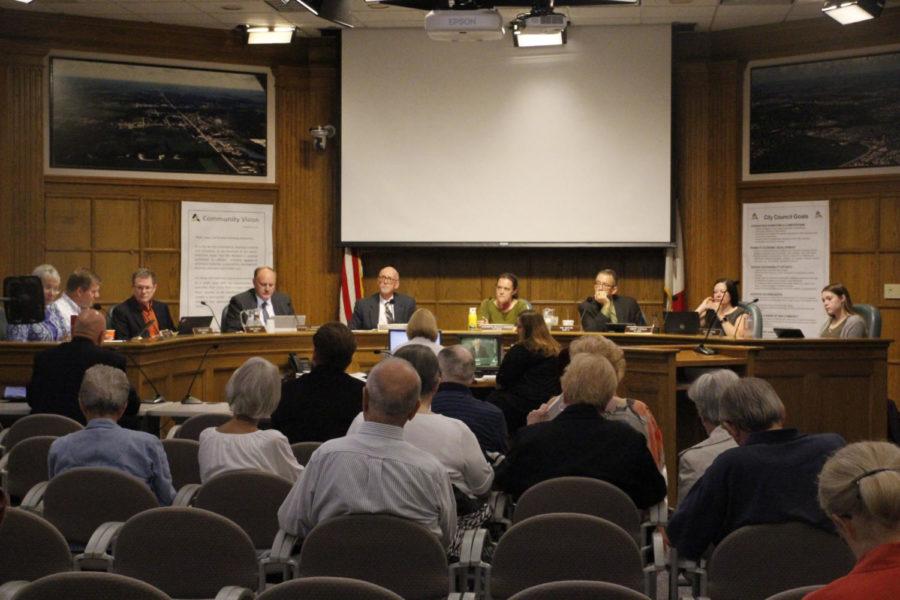- App Content
- App Content / News
- News
- News / Politics And Administration
- News / Politics And Administration / City
Rental cap exemptions pass after council suspends rules
Gillian Holte/Iowa State Daily
Ames City Council meets on Aug. 28 at city hall. The council voted on the rental cap proposal.
August 28, 2018
City Council met Tuesday to pass rental cap exemptions for the last time and finish their ongoing, four-month discussion of the ordinance.
The exemptions hope to provide pathways for individuals who were put under financial hardship because of the rental cap to rent out their property. The rental cap was passed in May, setting the limit for the number of rental properties in neighborhoods near campus to 25 percent.
The exemptions were brought back to council following the ordinances veto on Aug. 6.
“We have brought this ordinance back at the councils direction,” said Mark Lambert, attorney for the City of Ames. “We made three changes that we were directed to by council. The first one was to come up with a definition on bonafide rental. The second was to make the effective date from having a specific date to thirty days after the effective date of the ordinance.
Lambert said the third change was to narrow the language that would allow someone to retain a Letter of Compliance (LoC), the document needed to make a property a rental, in homes not in compliance with the rental code in certain instances. This applies to homes renting a single room to a family member in one and two bedroom homes.
These changes were made as a direct result of the concerns raised by Mayor John Haila when he vetoed the ordinance.
Haila said in a statement that language added made the ordinance “inconsistent” with the intentions of council.
“I believe that the spirit and principle of what Council has worked on for months was compromised,” Haila said in the statement.
When the ordinance was vetoed then brought back, it procedurally had to start over in its passage. Like all ordinances, this means it would have to be passed three more times.
As the council had been focusing on this ordinance more than three months, they suspended the rules to allow for all three passages to happen at the meeting. The first passage was successful on a 4-2 vote: Ward One representative Gloria Betcher and Ward Three representative David Martin were the two votes in opposition.
At previous meetings, Betcher voiced her opposition to the ordinance, saying it undermined the idea of the rental cap which passed on May 22 on a 5-1 vote.
“Even one property is more than zero,” Betcher said at the Aug. 14 meeting about extending the rental exemptions to single room renters and family renters. “Those are more houses we have to reclaim over the course of the ordinance if we want to return the rental percentage to 25 percent.”
Although Martin and Betcher opposed the ordinance, the council unanimously voted to suspend the rules and allow for all three passages at the meeting. A vote that would have required five of the six members to allow.
“We have already gone over this, and the only reason we had to pass it over again was due to a parliamentary procedure issue from the veto,” Betcher said. “There wasn’t much more to discuss, and we’ve already heard arguments from both sides multiple times. This is a way we can help those who have hardships from the cap.”
Betcher said there were people who are having legitimate hardships due to the rental cap but did not support how far the exemptions had gone.
“I voted no because of the expanding exceptions part,” Betcher said. “I wasn’t against hardship exemptions in principle.”
The second and third passages of the ordinance succeeded on a 4-2 vote.
The ordinance creates two sets of criteria for people to receive an LoC.
Under the first exemption, which is the broader of the two exemptions, the property owner must have owned the property as of Oct. 27, 2017 and the property must be the primary residence of the property owner, or the property owner must have obtained a building, electrical, plumbing or mechanical permit within one year before the date of Oct. 27.
All applications for this exemption must be received one month after the official passage of the ordinance, and property owners will then be given six months to make the necessary changes to fall in compliance with the LoC.
The second exception is for people who have had a hard time selling their house as a result of the rental cap.
Homeowners may be able to apply for the exemption if they have rental properties surrounding them on three sides — or the substantial equivalent of three sides — and have been on the market for nine consecutive months.
People who apply for this exemption will be required to provide all declined offers on their house.
These houses must have home inspections similar to the previous exception.
Earlier iterations of the ordinance did not allow people to keep an LoC if they rented to a family member under language defining what a “bona fide rental” was. The language was later modified to include family renters.
Someone who rents out a single room is referred to as a roomer rather than a renter and does not typically adhere to renting code.
Mark Lambert, lawyer for the City of Ames, recommended the changes, as he believed there could be issues with equal protection of renters under the constitution.
If the city were to define who is a legal renter and who isn’t based on family status, the courts could take issue with that, Lambert said.







